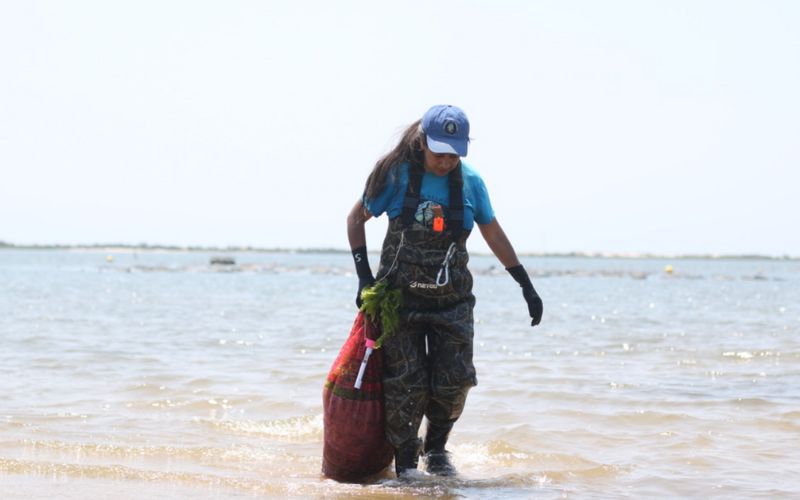
- Details
- By Jenna Kunze
A county on New York’s Long Island overnight changed the name of a local aquaculture leasing program whose acronym spelled out “SCALP” after receiving condemnation from the area’s Indigenous kelp farmers.
The program, called the Suffolk County Aquaculture Lease Program, or SCALP for short, began leasing underwater land in Peconic Bay and Gardiners Bay in 2009 for shellfish cultivation, according to the county’s website. According to Shinnecock Nation attorney Tela Troge, the program was initially referred to as “the leasing program” until around 2019, when the county began referring to the program online as ‘SCALP’.
On March 20, the Shinnecock kelp farmers, a group of tribal women from the Shinnecock Indian Nation, located in Suffolk County on Long Island, first learned of the leasing program’s name and intention. They quickly published a press release condemning the insensitive name of a program that seeks to profit off of waters the Shinnecock have unceded territorial claim of.
Shinnecock tribal citizens took issue with both the program name— that invokes a colonial history where European settlers collected bounties for Native scalps—and also the county’s jurisdictional assertion of an underwater area it stole from those same Indigenous nations.
“We vehemently condemn Suffolk County's SCALP program, which not only erases Indigenous history but also glorifies the history of scalping,” the press release reads. “The use of such a term is deeply offensive to Native Americans because it refers to a practice that was used against them during conflicts with European settlers. It invokes memories of violence, genocide and cultural trauma inflicted upon our communities. Additionally, the commodification of scalps as bounties contributed to the dehumanization and marginalization of Indigenous peoples. The term is disrespectful and insensitive.
In the early morning on March 21, Suffolk County Legislator Anne Welker called Troge to apologize for the program name, and immediately moved to have it changed from the county’s website, Troge said.
According to a county spokesperson, by the time Welker reached out to the county to advocate for a program name change, the change had already been made. The site now calls the program the “Aquaculture Lease Program”, or the ALP, with no mention of an overnight name change.
Troge said the county also removed the erroneous history it had included on its website about shellfish farming in the local bays, which noted the beginning of Shellfish farming in the late 1800s, ignoring the Shinnecock peoples 13,000 years of farming before the arrival of Europeans.
“The one fact is that we never relinquished any [of] the bay bottoms, our water rights, or our ancestral hunting and fishing rights from first contact to present day,” Shinnecock tribal ambassador Lance Gumbs told Native News Online. “Choosing that name for their project just goes to show the continued disregard for the historic trauma we still carry to this day for the inflections levied upon us by the first Europeans.”
In addition to a program name change, the Shinnecock Kelp Farmers called for co-management of lease areas with Shinnecock Kelp Farmers, acknowledgment of Shinnecock underwater land rights, and meaningful consultation with tribal nations. Troge said the county and the department managing the ALP program set a meeting with the Shinnecock Farmers for April 2.
“I think we'll have a lot to talk about,” Troge said.
Suffolk County did not respond to Native News Online’s request for comment before press time.
Editor's Note: This story has been updated to reflect a comment by the county about the timing of the name change on the program's name change on the county website.
More Stories Like This
Sault Tribe Joins the Fight for Mother Nature’s Legal Rights with New ResolutionFormer NCAI President Fawn Sharp Appointed to Nature Conservancy Board
New Interagency Agreement Supports Water Tribal Water and Sanitation Projects
Biden Unrolls Multi-Million Dollar Solar Grant on Earth Day, More to Come Throughout Week
Native American Rights Fund Gets $100K For Tribal Eco-Stewardship Legal Support
Native Perspective. Native Voices. Native News.
We launched Native News Online because the mainstream media often overlooks news that is important is Native people. We believe that everyone in Indian Country deserves equal access to news and commentary pertaining to them, their relatives and their communities. That's why the story you’ve just finished was free — and we want to keep it that way, for all readers. We hope you'll consider making a donation to support our efforts so that we can continue publishing more stories that make a difference to Native people, whether they live on or off the reservation. Your donation will help us keep producing quality journalism and elevating Indigenous voices. Any contribution of any amount — big or small — gives us a better, stronger future and allows us to remain a force for change. Donate to Native News Online today and support independent Indigenous-centered journalism. Thank you.

